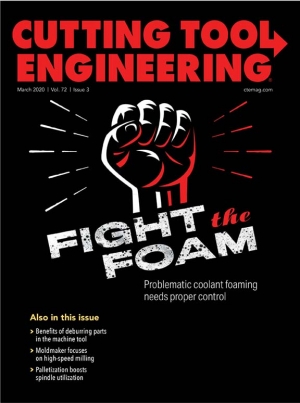Speed, strength, longevity and efficiency reportedly enable the EdgeX4 solid-PCD cross-center-tipped drill to meet production goals and reduce the cost per hole. Developed by West Ohio Tool Co., Russells Point, Ohio, the tool is applicable to any industry that drills composites, plastics, aluminum and other nonferrous metals.
“One of the ways that it’s faster is its four- to six-week delivery time,” said CFO Kaci King.
She said that is 75% faster than the standard lead time for PCD specials. In addition, the tool reduces cycle times.
“It runs at faster speeds because we use the strongest PCD material available,” King said.
She said the material improves wear resistance compared with a standard PCD grade.
PCD is measured by grain sizes that range from nanometers to hundreds of micrometers, usually referred to as nanocrystalline and microcrystalline, said Kerry Buchenroth, founder of West Ohio Tool. Smaller particles in higher quantities provide a higher-grade tool. The concentration of higher-quantity grain improves tool performance.
The twist-flute version of the EdgeX4 drill. Image courtesy of West Ohio Tool
King said the EdgeX4 offers a cutting speed that is up to three times faster than a solid-carbide drill. The drill’s cross-center tip eliminates all carbide cutting edges.
By having a drill with PCD across its entire center, one customer extended tool life from 350,000 holes with an outboard-tipped PCD drill to 1 million holes with the EdgeX4, she said. The concentrated PCD provides an attractive material for machining carbon fiber-reinforced polymer composites in terms of long tool life, high cutting speeds, fine surface quality, short cycle times and enhanced cost efficiency.
Depending on the application, 800,000 to 1 million holes can be drilled with the EdgeX4 without regrinding or re-tipping, King said. Also, premature breakdowns of drill points are reduced. In comparison, solid-carbide drills achieve approximately 25,000 holes and can be reground a maximum of 10 times after producing 20,000 holes for each regrind. PCD outboard-tipped drills achieve 350,000 holes without a regrind or re-tip when drilling die-cast aluminum.
“Anytime you go from 250,000 to 800,000, cost per hole is so cheap,” Buchenroth said.
Benefits include needing fewer tools in inventory, having fewer breakdowns and reducing machine downtime.
“Many people that manufacture diamond drills are doing outboard tipping,” Buchenroth said. “The carbide center at the chisel is what takes all the beating in a carbide or outboard-tipped drill.”
The EdgeX4 has been tested in the laboratory and by manufacturing partners of West Ohio Tool across the U.S., he said.
For more information about West Ohio Tool, call 937-842-6688 or visit www.westohiotool.com.
Contact Details
Related Glossary Terms
- composites
composites
Materials composed of different elements, with one element normally embedded in another, held together by a compatible binder.
- cutting speed
cutting speed
Tangential velocity on the surface of the tool or workpiece at the cutting interface. The formula for cutting speed (sfm) is tool diameter 5 0.26 5 spindle speed (rpm). The formula for feed per tooth (fpt) is table feed (ipm)/number of flutes/spindle speed (rpm). The formula for spindle speed (rpm) is cutting speed (sfm) 5 3.82/tool diameter. The formula for table feed (ipm) is feed per tooth (ftp) 5 number of tool flutes 5 spindle speed (rpm).
- polycrystalline diamond ( PCD)
polycrystalline diamond ( PCD)
Cutting tool material consisting of natural or synthetic diamond crystals bonded together under high pressure at elevated temperatures. PCD is available as a tip brazed to a carbide insert carrier. Used for machining nonferrous alloys and nonmetallic materials at high cutting speeds.
- wear resistance
wear resistance
Ability of the tool to withstand stresses that cause it to wear during cutting; an attribute linked to alloy composition, base material, thermal conditions, type of tooling and operation and other variables.










